All about the profession of criminologist
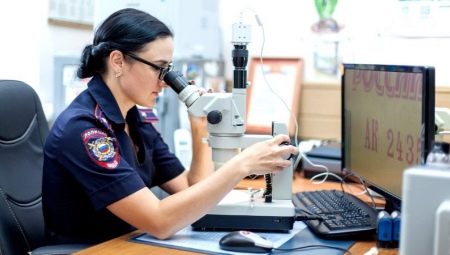
If you are interested in law, the exact sciences, love watching detective series and dream of working in law enforcement agencies, then you should turn your attention to the profession of a forensic expert. Today in our article we will consider in detail the features of the professional activity of such a specialist.
Who is this and what does he do?
Forensics is a complex and complex science. A person with the appropriate education and practical training in the specialty can occupy such narrow-profile positions as a forensic chemist or a forensic psychiatrist.
One way or another, the job of a specialist is to collect and research evidence from the crime scene.
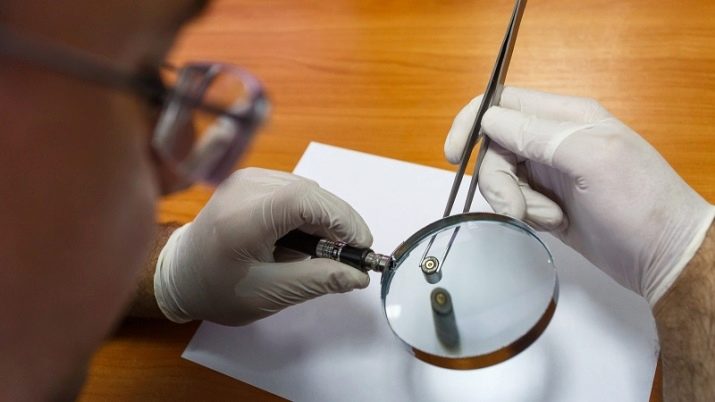
A person in the position of a criminalist is engaged in the study of the laws of crimes, the study of the mechanism for carrying out illegal actions, the existing methods and methods of hiding their traces, and also develops various methods of analyzing material evidence. As you can see, the duties of a specialist include a large number of complex and diverse tasks.
In the course of exercising their professional functions the forensic scientist (together with the investigator) travels to the scene of the crime, participates in the examination and collection of evidence, and also solves other types of tasks directly on the spot... In general, the work of a specialist can be divided into 2 stages. So, at the crime scene, the specialist conducts a preliminary analysis and carries out preparatory work, and the direct study of the materials obtained takes place already in the laboratory.
Depending on the specialization of the forensic scientist, he can carry out a variety of types of examinations: for example, traceological, ballistic, fingerprinting, graphological... However, some professionals can only perform one of them, while others are versatile specialists. One way or another, laboratory tests conducted by a forensic scientist help law enforcement officers to investigate a crime and find the perpetrators.
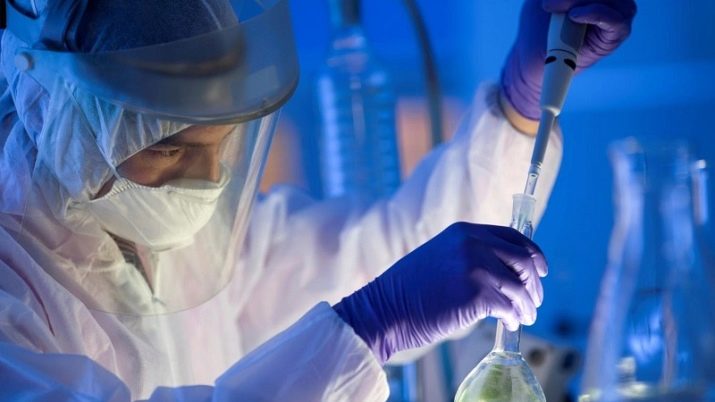
Pros and cons of the profession
The work of a forensic scientist (like any other professional activity) is distinguished by its special characteristics and individual characteristics. It is important to keep in mind that they are not only positive, but also negative. Before you finally decide that you want to connect your life with such a career, you need to weigh the pros and cons.
First, let's look at the benefits of the profession.
- High level of demand for specialists... Forensic experts with a high level of qualifications, in-depth knowledge, as well as work experience and specialized hands-on skills are highly sought after by employers. The thing is that this profession in itself is quite difficult, therefore, it is very difficult to find a truly competent employee. If you are such a specialist, then employers will compete for your candidacy.
- Social benefits... Most often, criminologists work in government agencies and departments. Accordingly, thanks to official employment, you can count on a full social package (including paid leave and sick leave). In addition, specialists are offered various benefits (for example, free spa treatment).
- Decent salaries... To begin with, it should be said right away that at the beginning of his career, a forensic specialist cannot count on a high salary. However, with the acquisition of experience and skills, as well as moving up the career ladder, the material remuneration for the work of a specialist can increase significantly.
Thus, the salary of a leading specialist can be about 150,000 rubles.
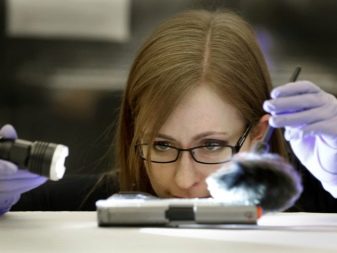

It is worth paying attention to the existing disadvantages of the profession.
- High stress and emotional stress... In the course of performing his work duties, the criminologist is constantly at the scene of violent crimes: murders, rapes, etc. This cannot but affect the emotional and psychological state of the employee. In this regard, professionals often have to seek help from psychologists (especially young professionals). I must say that over time, the level of impressionability decreases.
- Risks and dangers... Due to the fact that the criminologist is directly related to the criminal world, he can be exposed to all sorts of risks and dangers. So, for example, he can be blackmailed and demanded to issue a false expert opinion.
- Irregular work schedule... Despite the fact that when you are hired for a job, you will be offered a work plan and schedule, your professional activity will not always fully comply with such a schedule. Very often you will have to work late at night, on weekends or holidays.
- Harsh working conditions... A forensic scientist is not an office worker. The specialist spends part of his time in the laboratory, however, another part of the work is carried out directly at the crime scene. At the same time, it can be located, for example, on the street, where in conditions of 30-degree frost you will have to collect the necessary evidence. Thus, the profession of a forensic scientist is very difficult and demanding, with which not every person can cope.
So that in the future you do not regret your choice, you should evaluate in advance all the existing disadvantages of the profession.

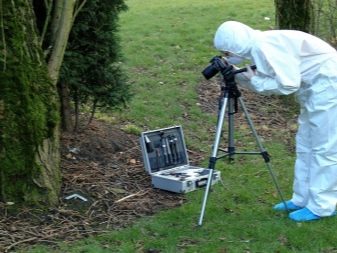
Requirements
Due to the peculiarities of the profession, which were described in detail above, employers put forward increased requirements for applicants for the position of a forensic expert. Moreover, they relate not only to professional skills, skills and knowledge, but also to the personal characteristics of a person.
Professional skills
First of all, it must be said that a forensic expert should know a lot and be able to. Consider the specific professional requirements for a specialist.
- Knowledge in the field of forensic science is basic for an expert.... So, a specialist must know all existing methods, scientific technologies, types of expertise, etc. If you plan to move up the career ladder and be not an ordinary, but a leading employee, then you need to take care of developing your own ideas and hypotheses.
- Ballistics Is an area of scientific knowledge in which a forensic scientist should be well versed. Thanks to in-depth theoretical knowledge in this area, a specialist will be able to properly examine the weapon, determine how the murder was committed, at what distance the criminal was from the victim, how tall he was, etc.
- Criminologist must be able to carry out an examination of explosives (this applies to both direct explosive compositions and explosive devices). With sufficient knowledge, an expert will help the investigator to understand the circumstances of the explosion.
- When examining various documents and written evidence knowledge in the field of graphology will be indispensable... This scientific area will help the forensic scientist determine the psychological state of the writer, compare handwriting samples and ultimately identify the perpetrators of the crime.
- In modern realities, investigators and operational employees very often meet with audio and video evidence... In order to recognize speech, detail the image, establish the belonging of a voice to a particular person, as well as assess the reliability of the recording as a whole, law enforcement officers must turn to forensic experts for help.
- Detailed knowledge of fingerprinting (both its theoretical foundations and the possession of the necessary practical skills) is a basic requirement for every expert. This science allows you to identify a participant in a crime using fingerprints, which are unique and inimitable for each individual person.
- If any physical marks (such as shoe marks or tire marks) are found at the crime scene criminologist turns to trasological examination.
- If, in the process of committing a wrongful act, the offender left his genetic traces (for example, traces of blood or saliva), then a forensic scientist who is collecting evidence in this case must make a DNA test.
- Another type of research that a highly qualified specialist should own is autoscience expertise... Thanks to special techniques, a professional will be able to identify the author of a document found at a crime scene (including its authenticity).
It should be noted that the more professional skills and knowledge a specialist has, the more in demand he will be on the labor market. Accordingly, he can count on high material remuneration for his work.
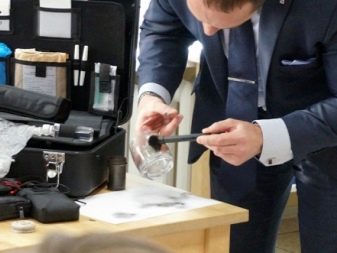

Personal qualities
In addition to the necessary professional characteristics, which are key for every criminologist, and without which a specialist will not be able to fully carry out his work functions, many employers put forward requirements in relation to personal qualities.
The most important character traits that an expert should have include:
- erudition;
- high intellectual level;
- striving to improve and expand their professional knowledge;
- good memory;
- stress tolerance;
- emotional stability;
- Analytical mind;
- logical thinking;
- the ability to concentrate on one task for a long period of time.
If you successfully combine the necessary professional and personal characteristics, then you can become a successful professional who is in high demand in the labor market.

Education
If you dream of becoming a forensic expert, then the first step you need to take towards achieving your goal is getting an appropriate education. You can become a criminologist with almost any higher education. You only have to take retraining courses... But if you enter a university immediately after the 11th grade of school, then you should choose exactly the direction that interests you. So, first of all, you need to choose a suitable educational institution (and it should be an institute or university, not a college).
It is recommended to give preference to specialized educational institutions, namely the universities of the Ministry of Internal Affairs of Russia.
Such establishments are located in almost all major cities of Russia (for example, Moscow, St. Petersburg, Volgograd, Saratov, etc.). Here you need to choose the appropriate direction of study, namely - "Forensic examination".
Before entering the university, you need to visit its admissions office and find out in detail what subjects you need to take on the exam, whether the applicant must pass the entrance exams. It should be borne in mind immediately that it is very difficult to study to be a criminalist. Wherein you will have to devote a lot of your energy and attention not only to theoretical, but also to practical training... So, you will not only get acquainted with the process of conducting various kinds of forensic examinations, but also learn hand-to-hand combat, fire training, etc. After graduation, you will not have to look for work on your own, since the university will give you directions. However, you can be sent to work in the most distant corners of our country, which is not suitable for every graduate. In this regard, many applicants enter universities of a wider profile.
A young specialist should take into account the fact that the learning process does not end with the receipt of basic education. The point is that forensic science is a field of knowledge that is constantly evolving. Scientists invent new methods and principles, make discoveries. That's why to maintain your intellectual level, you need to attend various educational events on an ongoing basis: lectures, conferences, master classes, workshops, etc. Only in this case you will be able to stay abreast of all the latest trends and become a relevant specialist in the labor market.
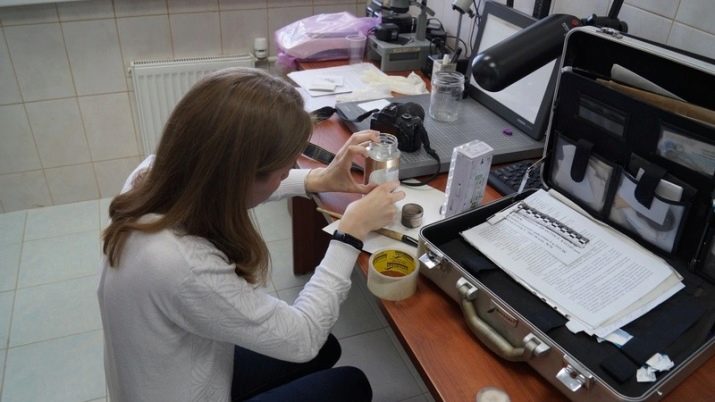
average salary
The material remuneration for the work of a forensic expert varies significantly depending on his place of work, the sector in which he carries out his professional activities (public or private), as well as the region of residence (professionals living in large cities and the capital earn more than those that work in the provinces).
In general, the average salary of a criminalist working in Russia is about 45,000 - 60,000 rubles... At the same time, in starting positions, a young specialist can receive a smaller amount. On the other hand, the salary of leading experts can exceed 100,000 rubles. Thus, material remuneration (among other things) also depends on the work experience and qualifications of a specialist.
Place of work
All forensic experts working today can be divided into 2 broad categories depending on where they work.The 1st category includes those specialists who carry out their professional activities in government agencies, and the 2nd group of criminalists works in private forensic organizations. If we talk about specific places of work, then first of all, it is necessary to highlight a variety of law enforcement agencies (police, prosecutors, investigative committee, etc.), as well as scientific laboratories.
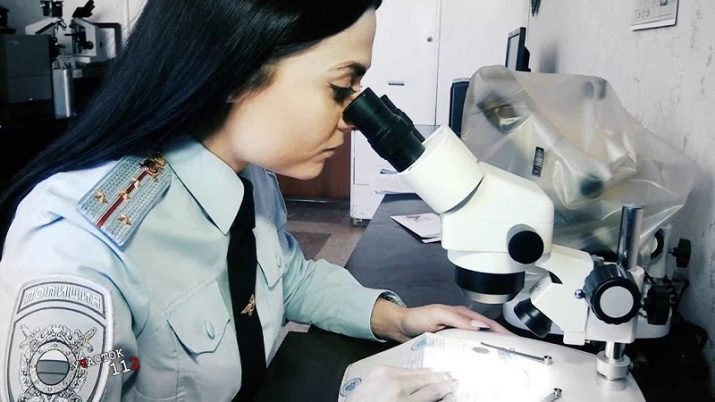
Prospects and career growth
Immediately after graduation, a young man cannot apply for the position of a criminalist. Most likely his will hire an assistant expert... Thus, the future criminologist will be able to gain initial experience, which is invaluable for the subsequent implementation of work activities, as well as learn the necessary skills and abilities. Also, in the process of work, the theoretical knowledge of the specialist will be replenished and strengthened. After some time, you can apply for the position of a criminalist... If in the course of your professional activity you prove yourself as an active and proactive employee, you will improve your qualifications and constantly develop, then you can be further appointed to a managerial position. In addition, within the framework of the civil service, over time, you can move to work in a related specialty.
If you decide to work in the private sector, then after graduation you can be hired to work in a forensic laboratory. Over time and if you wish (as well as if you have the necessary resources), you will be able to open your own organization and hire subordinate employees... In addition, many forensic experts choose to pursue the path of scientific and educational careers. For example, you can become a scientist and specialize in one area that interests you the most. There is also an opportunity to become a professor and work as a lecturer at the university or give independent lectures for young professionals throughout the country.
The profession of a forensic scientist is very interesting and complex. It is also beneficial to society. That is why every year hundreds and thousands of young people enter the relevant areas of training in the universities of our country.
However, it is worth considering in advance the fact that in order to become a highly qualified professional, you need to put a lot of effort and work.









